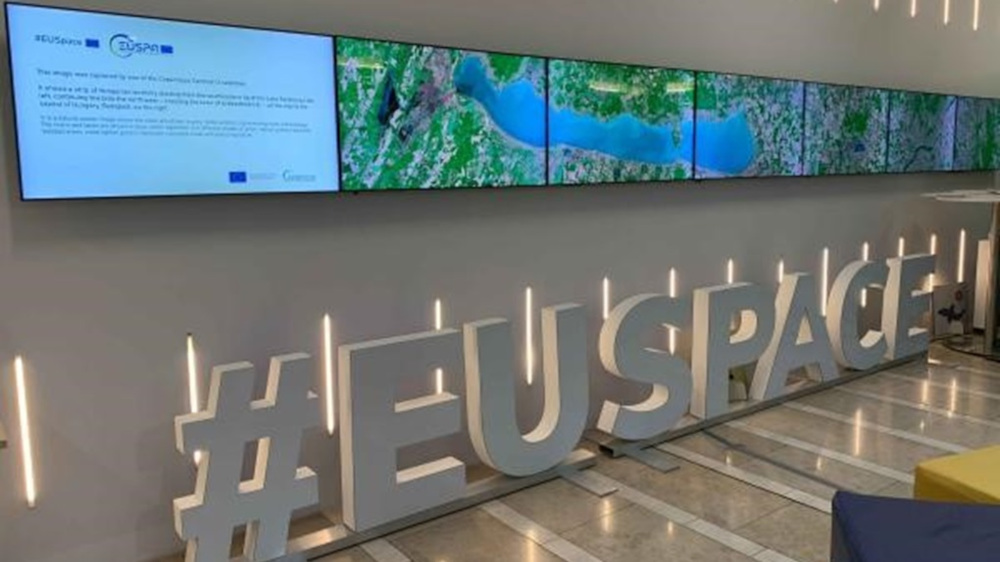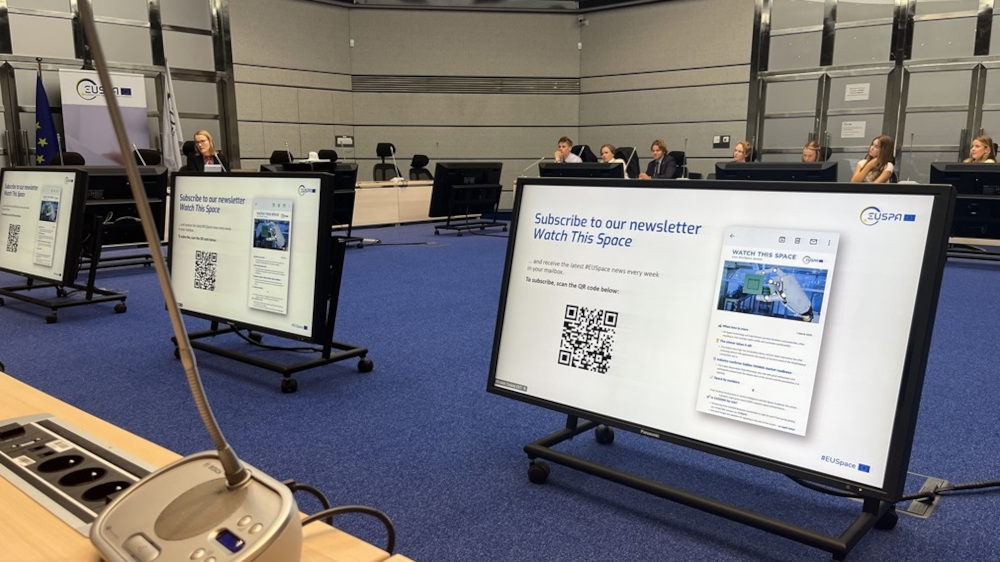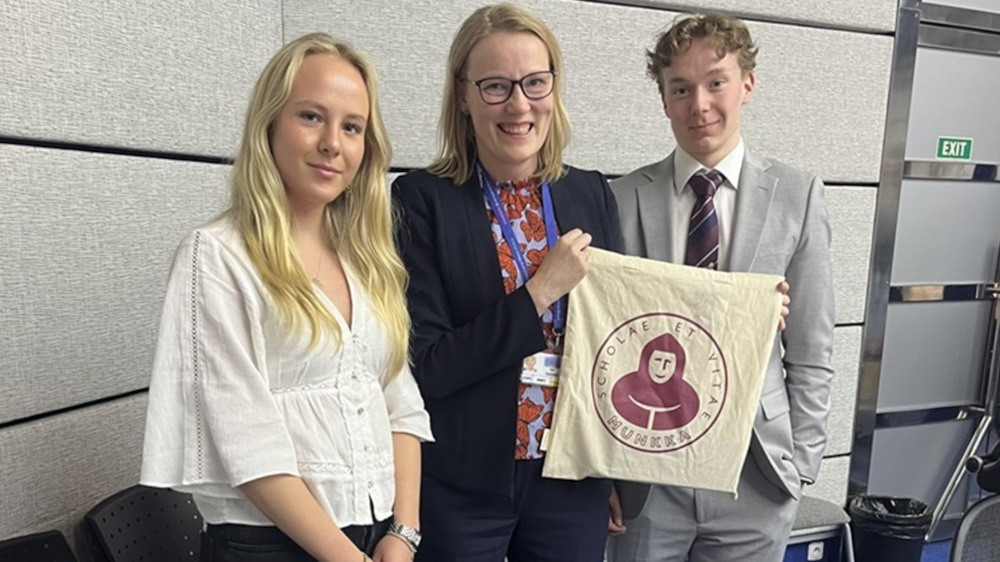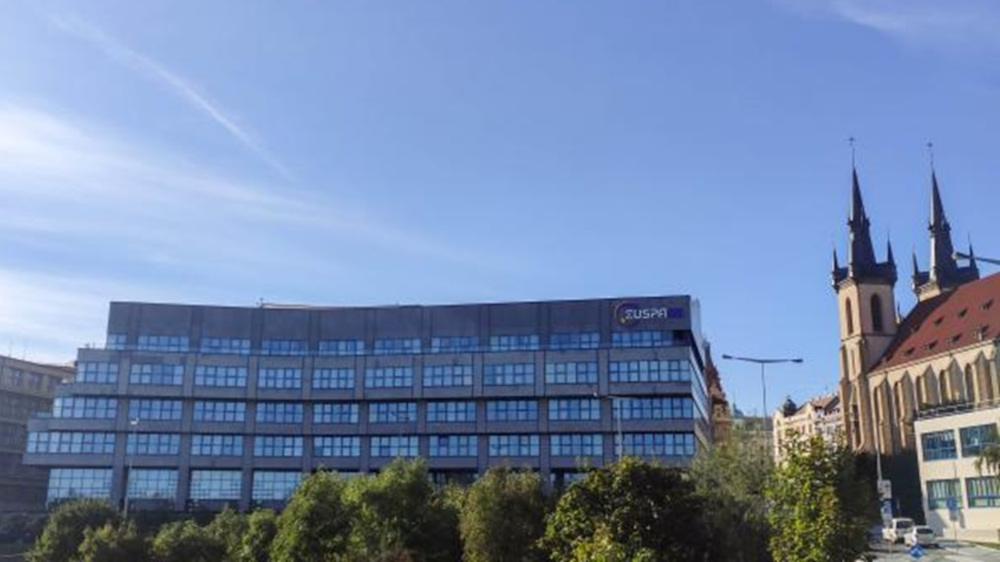Study Visit of Munkkiniemi Joint School to the European Union Agency for the Space Programme

The Social Sciences and Economics Division of Munkkiniemi Joint School’s (MYK) upper secondary school in Helsinki learned about space activities by visiting the European Union Agency for the Space Programme (EUSPA) in Prague. SpaceFinland expresses its gratitude for the attached travel report.
Student Report on the visit to EUSPA
After an engaging visit to Charles University, the delegation from Munkkiniemi Joint School’s Social Sciences and Economics Division headed to the European Union Agency for the Space Programme (EUSPA), located west of central Prague. We were welcomed by Kati Tahvonen, an official working in EUSPA's Marketing and Innovation Department.
From our preparatory research, we had learned that EUSPA is a decentralized agency of the European Union, established in 2004. It manages the EU’s space programme services, including the Galileo and EGNOS satellite navigation and positioning systems, as well as the Copernicus environmental monitoring network. Its responsibilities include service operations, ensuring security, market development, and supporting innovation. While headquartered in Prague, EUSPA has an unusually wide network of offices across Europe, including in France and Spain, following the agency’s reorganization in 2021.
After a thorough security check, Tahvonen – one of the few Finnish employees at the agency – began our visit with a brief tour of the lobby area. We then moved to the agency’s impressive plenary hall, used for meetings of EUSPA’s international management board. A large globe hanging from the ceiling made a strong impression on us.

Once seated at the microphone-equipped desks, Tahvonen shared her diverse career path. She studied geomatics, with a focus on remote sensing, at Aalto University’s School of Engineering. Early in her career, she worked at the National Land Survey of Finland and the Finnish Environment Institute. Her interest in international opportunities led her to Nairobi, where she worked on an environmental project as a UN Junior Professional Officer. Her varied roles in both international and national organizations, along with her broad expertise, eventually led her to EUSPA. She has also participated in the Slush technology and startup event, where students from our school have volunteered for several years as part of the Slush Volunteer Course.
In her presentation, Tahvonen explained how EUSPA’s space programme centers on using satellites for the benefit of EU citizens. The most important of these are the Galileo satellites – about the size of a small SMART car – one of which is displayed as a model in the agency’s entrance hall. Galileo is the EU’s own satellite navigation system, part of the global GNSS network, and named after the Italian astronomer Galileo Galilei. It serves as the EU counterpart to the U.S. GPS and China’s BeiDou systems. Galileo is used in various applications, such as smartphone positioning and banking systems. Unlike other systems, Galileo is civilian-controlled rather than military-operated.
We also learned about the Copernicus Earth observation programme, which monitors our planet and its environments via satellites for the benefit of all EU citizens. Copernicus is used in at least six areas: atmosphere, water bodies, land, climate change, security, and emergency response. The Copernicus programme explores the environment for various purposes; for example, the climate and its changes. The aim is to increase safety and improve the ability to react, for example, to various emergencies that affect people.
During the visit, our students posed challenging questions to the experts, including about the division of responsibilities between EUSPA and other organizations in the field. We received an answer to a question that had come up during breakfast: the seemingly overlapping mandates of EUSPA and the European Space Agency (ESA). However, the mandates are defined in the Regulation establishing the EU Space Programme (EU 2021/696). According to Tahvonen, EUSPA manages ready-made services and supports user cooperation, while ESA develops and builds space technology and satellites. The two agencies work closely together – ESA develops, and EUSPA operates.
The role of Finnish companies in the space technology market also proved to be a timely topic. While we were already familiar with Nokia’s space tech from Slush, Tahvonen emphasized, for example, the importance of ICEYE on both a Finnish and global scale. ICEYE is a Finnish company that manufactures cutting-edge SAR satellites. At the end of the Q&A section, Tahvonen characterised the current competitive state of Finnish space expertise by referring to Professor Jaan Praks, who worked at Aalto University, stating: "Finland is a good example of how one man can influence an entire field”.

After Tahvonen’s presentation, we heard about career opportunities at EUSPA and more broadly within the European Union, where, as we had learned earlier at the EUDEL in Vienna, Finnish officials are increasingly underrepresented. Sjurdur Djurhuus, head of recruitment at EUSPA’s HR department, spoke to us about this topic. Like other EU agencies, EUSPA offers jobs in various fields, including engineering, finance, and communications. These positions are open to all EU citizens, as well as Norwegians and Icelanders.
Our students were particularly interested in the practical aspects of the job application process. Djurhuus emphasized the importance of the motivation letter, stating: “It’s your chance to bring something new to your application”. He also advised us to tailor each application carefully to the specific position to ensure it stands out to recruiters.
After the event, our reporting team stayed behind to speak further with Djurhuus about his own duties and the Space Programme Agency as a working environment. We were especially interested to learn that his responsibilities include promoting equality and diversity in the workplace.
We would like to extend our sincere thanks to EUSPA, and especially to Kati Tahvonen and Sjurdur Djurhuus, for a rewarding visit. We left into the warm early spring evening of Prague with new insights – and EUSPA tote bags filled with notepads with the agency's logo, ready for our future notes.
Saimi Sääskilahti (1C) and Tuomas Tuohimaa (3C), Munkkiniemi Joint School
As part of its activities, the Social Sciences and Economics Division of Munkkiniemi Joint School’s upper secondary school organizes an annual spring study trip abroad, with the destination cities changing each year. In recent years, we have visited cities such as Geneva, Paris, Frankfurt, The Hague, and Madrid. The travel itinerary aims to include a comprehensive selection of study visits, for example, to Finnish embassies and intergovernmental international organizations. The program also typically features visits to relevant universities in the destination cities, along with a diverse range of cultural experiences. The destinations for the spring 2025 study trip included the Finnish embassies in Prague and Vienna, as well as Finland’s Permanent OSCE Mission and the OSCE’s international secretariat in the latter. At the United Nations, the program included meetings with staff from the International Atomic Energy Agency (IAEA), the United Nations Industrial Development Organization (UNIDO), and the United Nations Office on Drugs and Crime (UNODC). As part of our active participation in the European Parliament Ambassador School network, the EU-related visits included the EU Delegation (EUDEL) of the European External Action Service (EEAS) in Vienna and the European Union Agency for the Space Programme (EUSPA), headquartered in Prague. As other international themes, we got acquainted with the supervision of the interests of oil-exporting countries in OPEC, postgraduate study opportunities at Charles University and Vienna University of Economics and Business (WU), and a meeting with Sparta Prague and Finnish national football team coach Tim Sparv, who provided insights into the results-driven world of professional sports as a work environment. It is worth noting that all students contribute to reporting on the trip within their areas of responsibility as part of their final project for the Social Sciences and Economics Division. Furthermore, the latest upper secondary school curriculum emphasizes not only the importance of internationalization and language skills but also the mastery of broader thematic entities and various working life skills – all of which the study trip and its meetings aim to bring to life.ukaan konkretisoivat. Sami Moglia, Teacher |





